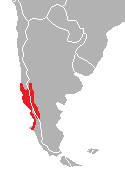| Southern pudu | |
|---|---|

| |
| Southern pudu (P. puda) | |
| Conservation status | |
 Near Threatened (IUCN 3.1) | |
| CITES Appendix I (CITES) | |
| Scientific classification | |
| Domain: | Eukaryota |
| Kingdom: | Animalia |
| Phylum: | Chordata |
| Class: | Mammalia |
| Order: | Artiodactyla |
| Family: | Cervidae |
| Subfamily: | Capreolinae |
| Genus: | Pudu |
| Species: | P. puda |
| Binomial name | |
| Pudu puda (Molina, 1782) | |

| |
| Geographic range of Pudu puda | |
| Synonyms | |
|
Capra puda Molina, 1782 | |
The southern pudu (Pudu puda, Mapudungun püdü or püdu, Spanish: pudú, Spanish pronunciation: [puˈðu]) is a species of South American deer native to the Valdivian temperate forests of south-central Chile and adjacent Argentina. It is classified as Near Threatened in the IUCN Red List.
Description
The southern pudu is characterized by being the second smallest deer in the world. It is slightly larger than its sister species, the northern pudu, being 35 to 45 cm (14 to 18 in) tall at the shoulder and weighs 6.4 to 13.4 kg (14 to 30 lb). The antlers of the southern pudu grow to be 5.3 to 9 cm (2.1 to 3.5 in) long and tend to curve back, somewhat like a mountain goat. Its coat is a dark chestnut-brown, and tends to tuft in the front, covering the antlers.
Range and habitat
The southern pudu lives in forests, including both mature and disturbed forests, typically with a dense understory, but it does nevertheless prefer open spaces with rich vegetation for feeding. It is found at lower elevations than its sister species, from sea level to 1,700 m (5,600 ft) elevation. In the Chilean Coast Range the pudu is found in primary and secondary broadleaf evergreen and alerce (Fitzroya cupressoides) forests, and sometimes in Eucalyptus plantations. In the southern Andes of Chile and Argentina it is associated with thickets of bamboo (Chusquea spp.) and Nothofagus dombeyi forests.
Foraging by southern pudu is thought to be detrimental for the regeneration of burned forests of Pilgerodendron uviferum.
Genetic diversity
Analysis of the mtDNA control region and cytochrome b of the southern pudu across Chile revealed that different populations have marked genetic differences, with a large number of unique haplotypes in each population and few shared haplotypes between populations. This indicates that gene flow is reduced and most populations are reproductively isolated from each other. The population from Chiloé Island is estimated to have become isolated from continental populations more than 200 thousand years ago and may constitute a separate subspecies. This reproductive isolation makes each population an important evolutionary unit but also increases their vulnerability since a drastic reduction in the number of individuals would decrease genetic diversity without recovery from migrating individuals coming from neighboring areas.
Further reading
- Colihueque, Nelson; Arriagada, Aldo; Fuentes, Andrea (2020). "Distribution modelling of the Pudu deer (Pudu puda) in southern Chile". Nature Conservation. 41: 47–69. doi:10.3897/natureconservation.41.53748.
- Molina, J. Ignatius (1809). The Geographical, Natural, and Civil History of Chili. Longman. p. 256.
References
- ^ Silva-Rodríguez, E.; Pastore, H.; Jiménez, J. (2016). "Pudu puda". IUCN Red List of Threatened Species. 2016: e.T18848A22164089. doi:10.2305/IUCN.UK.2016-1.RLTS.T18848A22164089.en. Retrieved 24 April 2023.
- "Appendices | CITES". cites.org. Retrieved 2022-01-14.
- Molina, Giovanni Ignazio (1782). "Il Pudu, Capra Puda". Saggio sulla storia naturale del Chili. Bologna: S. Tommaso d'Aquino. pp. 308–309.
- Muñoz Urrutia, Rafael, ed. (2006). Diccionario Mapuche: Mapudungun/Español, Español/Mapudungun (in Spanish) (2nd ed.). Santiago, Chile: Editorial Centro Gráfico Ltda. p. 184. ISBN 956-8287-99-X.
- "Forest South America". Animal Welfare Institute. Archived from the original on 2009-02-18. Retrieved 20 September 2009.
- ^ Burger, Andreas; Bannister, Jan R.; Galindo, Nicole; Vargas-Gaete, Rodrigo; Vidal, Osvaldo J.; Schlegel, Bastienne (2019). "Browsing evidence of the native and near-threatened Pudu puda deer in restoration plantings on Chiloé Island, Chile". Gayana. Botánica. 76 (1): 24–33. doi:10.4067/S0717-66432019000100024. S2CID 202853005.
- ^ Colihueque, Nelson; Cabello, Javier; Fuentes-Moliz, Andrea (21 June 2022). "Genetic divergence and demography of pudu deer (Pudu puda) in five provinces of southern Chile, analyzed through latitudinal and longitudinal ranges". Neotropical Biology and Conservation. 17 (2): 117–142. doi:10.3897/neotropical.17.e81324. eISSN 2236-3777. S2CID 249933031.

- Fuentes-Hurtado, Marcelo; Marín, Juan C.; González-Acuña, Daniel; Verdugo, Claudio; Vidal, Fernando; Vianna, Juliana A. (14 March 2011). "Molecular divergence between insular and continental Pudu deer (Pudu puda) populations in the Chilean Patagonia". Studies on Neotropical Fauna and Environment. 46 (1): 23–33. Bibcode:2011SNFE...46...23F. doi:10.1080/01650521.2010.537906. eISSN 1744-5140. ISSN 0165-0521. S2CID 85158582.
| Taxon identifiers | |
|---|---|
| Pudu puda |
|
| Capra puda | |